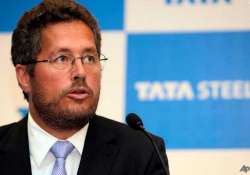Tata Steel Europe to cut output, jobs
New Delhi, Oct 11: Battling slowdown in demand for steel in Europe, Tata Steel plans to go for more layoffs and cut production in its European operations besides infusing funds to make it an “all-weather

New Delhi, Oct 11: Battling slowdown in demand for steel in Europe, Tata Steel plans to go for more layoffs and cut production in its European operations besides infusing funds to make it an “all-weather company”.
“This (job cuts) will be a process that goes on. You have definitely to expect further corrections,” Karl-Ulrich Kohler, Chief Executive Officer and Managing Director of Tata Steel Europe said.
The company had earlier announced that it would retrench 1,500 workforces in Europe, mainly in Northern England. Kohler, however, did not give any layoff figure for this time.
When asked whether the company would resort to production cut, he said: “We have two blast furnaces idle. We have currently blast furnace number-IV at Port Talbort being rebuilt. So for 4-5 months, we will depend on only one furnace. This will reduce the present capacity this year to a level of around 14 MT from old capacity of rather 18 MT”.
The blast furnace being rebuilt would be operationalised in December.
To make up for the subdued demand in Europe, the company has been looking for newer geographies for exports.
“We are trying to export a bit more to compensate the shortfall in Europe... Everything that is coastal, is of large interest to us, so we are looking at North African regions…we are looking at Mediterranean area, Africa. We are also trying to complement our offerings in India with some special products from Europe which we don't have in India,” he said.
Kohler said the company also plans to invest in its European operations to replace some of its existing equipment, rationalise the number of distribution centres and come out with new products.
“We have three things to do — one is new blast furnace in which we will be investing, we will update equipment so that infrastructure and energy utilisation is improved,” he said, adding that the company will condense the centres for product distributions.
“We will try to make Tata Steel Europe fit for a much much worse condition to be ready, as I said for all-weather,” he added.
Tata Steel Europe has been continuously affected in the absence of its captive source of raw material. In fact, this is the primary reason why it could not match with the performance of its Indian operations, which gets all the raw material from captive sources.
Kohler said Tata Steel Europe would receive its first shipment from Benga project in Mozambique by the end of this month or early next month, which would address the cost volatility affecting the operations in Europe.
The company holds 35 per cent stake in the Benga project.
“This (job cuts) will be a process that goes on. You have definitely to expect further corrections,” Karl-Ulrich Kohler, Chief Executive Officer and Managing Director of Tata Steel Europe said.
The company had earlier announced that it would retrench 1,500 workforces in Europe, mainly in Northern England. Kohler, however, did not give any layoff figure for this time.
When asked whether the company would resort to production cut, he said: “We have two blast furnaces idle. We have currently blast furnace number-IV at Port Talbort being rebuilt. So for 4-5 months, we will depend on only one furnace. This will reduce the present capacity this year to a level of around 14 MT from old capacity of rather 18 MT”.
The blast furnace being rebuilt would be operationalised in December.
To make up for the subdued demand in Europe, the company has been looking for newer geographies for exports.
“We are trying to export a bit more to compensate the shortfall in Europe... Everything that is coastal, is of large interest to us, so we are looking at North African regions…we are looking at Mediterranean area, Africa. We are also trying to complement our offerings in India with some special products from Europe which we don't have in India,” he said.
Kohler said the company also plans to invest in its European operations to replace some of its existing equipment, rationalise the number of distribution centres and come out with new products.
“We have three things to do — one is new blast furnace in which we will be investing, we will update equipment so that infrastructure and energy utilisation is improved,” he said, adding that the company will condense the centres for product distributions.
“We will try to make Tata Steel Europe fit for a much much worse condition to be ready, as I said for all-weather,” he added.
Tata Steel Europe has been continuously affected in the absence of its captive source of raw material. In fact, this is the primary reason why it could not match with the performance of its Indian operations, which gets all the raw material from captive sources.
Kohler said Tata Steel Europe would receive its first shipment from Benga project in Mozambique by the end of this month or early next month, which would address the cost volatility affecting the operations in Europe.
The company holds 35 per cent stake in the Benga project.